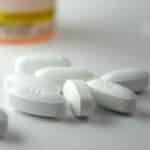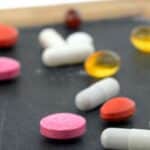Adderall and Dexedrine are stimulant drugs approved by the Food and Drug Administration (FDA) to treat attention-deficit hyperactivity disorder (ADHD) and narcolepsy. Both drugs are central nervous system stimulants, controlled substances, and have a high risk of dependence.
However, these drugs are not identical. Dexedrine contains dextroamphetamine sulfate. Adderall is a combination drug that contains a mixture of amphetamine salts. The difference in active ingredients means they may affect you differently, despite their similarities.
What Is Adderall?
Adderall is a prescription stimulant drug that contains two active ingredients: amphetamine and dextroamphetamine. Adderall can lessen symptoms of ADHD, including impulsive behaviors and hyperactivity.
Adderall is available in an immediate-release form and an extended-release capsule. The tablet is a short-acting drug and its effects peak within 3 hours and last up to 6 hours. Adderall XR is a long acting drug that can last up to 12 hours.
What Is Dexedrine?
Dexedrine is the brand name for dextroamphetamine, a CNS stimulant and prescription drug. It can also treat symptoms of ADHD and narcolepsy by altering brain chemistry. It affects the same neurotransmitters as Adderall to improve focus and attention.
Dexedrine is available in sustained-release capsules (Dexedrine Spansule) and extended-release capsules (Dexedrine ER). Both formulations are long-acting drugs that control the release of the medication over a longer period of time than immediate-release pills.
Effects Of Dexedrine & Adderall
Both stimulants work by increasing the amounts of the neurotransmitters dopamine and norepinephrine in the central nervous system (CNS). Increasing these brain chemicals can improve energy, attention, and alertness.
By increasing brain activity, both drugs are also effective in treating narcolepsy, a sleep disorder that causes extreme daytime drowsiness.
ADHD medications also include:
- Vyvanse (lisdexamfetamine)
- Ritalin (methylphenidate)
- Focalin (dexmethylphenidate)
- Desoxyn (methamphetamine)
Dexedrine and Adderall affect the brain in similar ways and may cause similar side-effects. The severity of side-effects depends on the strength, dose, and how well your body responds to the medication.
Common side-effects of Adderall and Dexedrine may include:
- insomnia
- increased heart rate
- high blood pressure
- headache
- dry mouth
- stomach pains
- loss of appetite
- weight loss
- anxiety
- nausea
- diarrhea
- constipation
Dexedrine & Adderall Share The Same Health Risks
Both ADHD medications can be effective when taken as prescribed. However, substance abuse increases the risk of experiencing serious side-effects, including overdose, drug interactions, and mental health issues.
Stimulant Overdose
Taking too much of either of these stimulants can have severe cardiovascular effects and may result in a drug overdose. A stimulant overdose can result in an irregular heartbeat, heart attack, seizures, coma, and sudden death.
Serotonin Syndrome
Serotonin is a naturally occurring neurotransmitter that regulates mood, sleep, and digestion. Serotonin syndrome is a dangerous condition that can occur when the body experiences a toxic build up of serotonin.
Taking a high dose of stimulants or mixing them with medications that increase serotonin levels can lead to serotonin syndrome.
Antidepressants, like selective serotonin reuptake inhibitors (SSRIs), are widely used prescription drugs that increase serotonin levels and can cause serotonin syndrome in high doses.
Signs of a severe case of serotonin syndrome include:
- fever
- high blood pressure
- irregular heart rate
- seizures
- coma
Stimulant-Induced Psychosis
Drug abuse involving stimulant medications can negatively impact mental health. Although stimulants can calm impulsivity and restlessness, heavy use can cause anxiety, panic, and psychosis.
Psychosis can result in a detachment from reality, including hallucinations and delusions.
Dexedrine & Adderall Are Both Habit-Forming
Both stimulants are schedule II controlled substances in the United States, which means there is a high potential for abuse and dependence. Even if you take stimulants as prescribed, they can cause chemical changes in the brain that can result in withdrawal symptoms if you stop.
Stimulant withdrawal is not life-threatening but symptoms can be mild to severe and interfere with daily life. If you develop withdrawal symptoms, you will likely experience cravings, which can result in a relapse or overdose.
One of the safest ways to treat stimulant withdrawal is in a detox program, where medical professionals can monitor your symptoms. Stimulant dependence is also a sign of a drug addiction, known as a substance use disorder (SUD).
Although addiction can be challenging to stop on your own, experienced specialists can help.
Stimulant Addiction Treatment
Most addiction treatment centers offer a personalized approach to treatment, which allows your treatment plan to be tailored to your needs and goals. At Northeast Addictions Treatment Center, we offer individualized outpatient treatment programs for stimulant addiction.
If you would like to learn more about our treatment center, please call our helpline today.
Sources
Written by
Northeast Addition Editorial Team
©2024 Northeast Addition Center | All Rights Reserved
This page does not provide medical advice.




